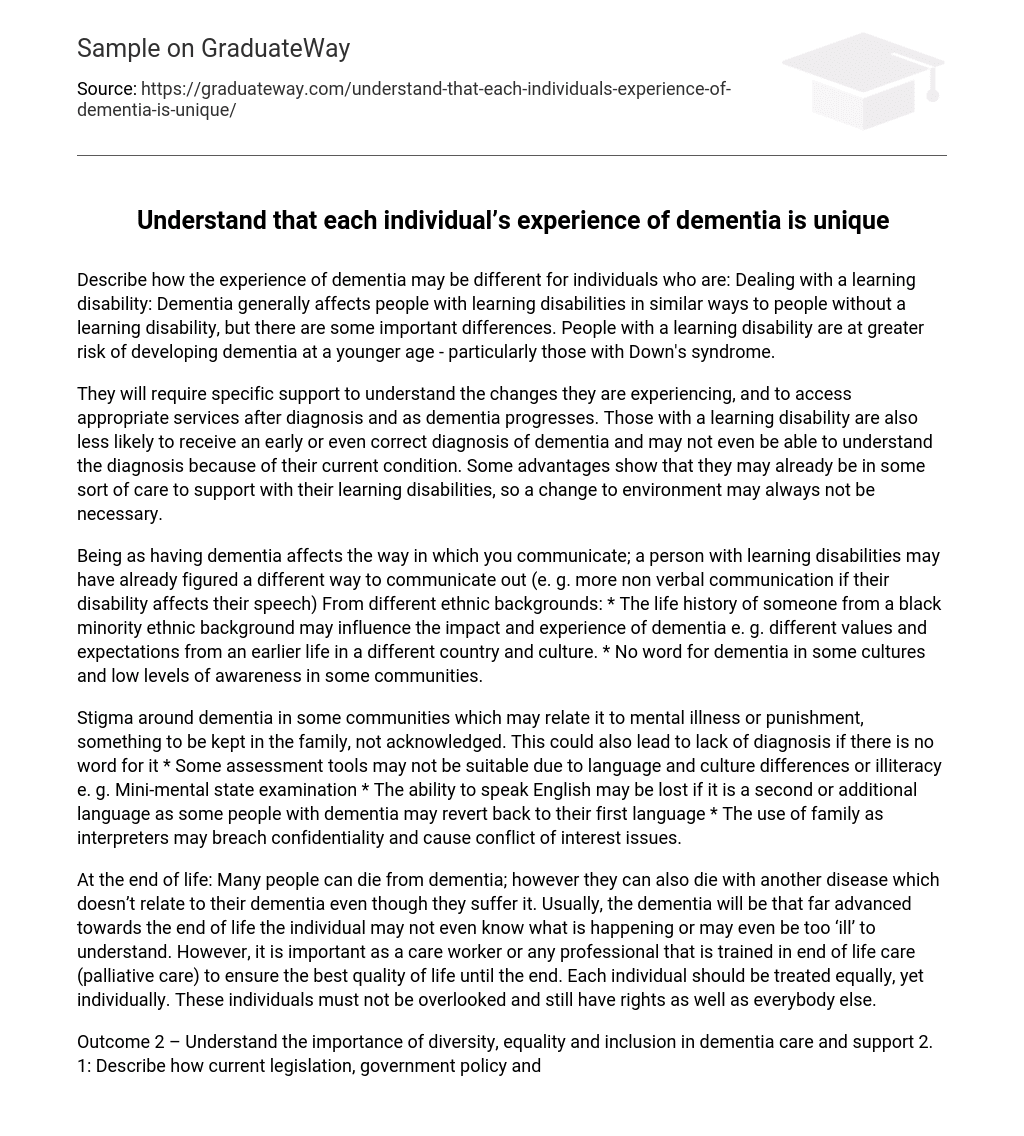Describe how the experience of dementia may be different for individuals who are: Dealing with a learning disability: Dementia generally affects people with learning disabilities in similar ways to people without a learning disability, but there are some important differences. People with a learning disability are at greater risk of developing dementia at a younger age – particularly those with Down’s syndrome.
They will require specific support to understand the changes they are experiencing, and to access appropriate services after diagnosis and as dementia progresses. Those with a learning disability are also less likely to receive an early or even correct diagnosis of dementia and may not even be able to understand the diagnosis because of their current condition. Some advantages show that they may already be in some sort of care to support with their learning disabilities, so a change to environment may always not be necessary.
Being as having dementia affects the way in which you communicate; a person with learning disabilities may have already figured a different way to communicate out (e. g. more non verbal communication if their disability affects their speech) From different ethnic backgrounds: * The life history of someone from a black minority ethnic background may influence the impact and experience of dementia e. g. different values and expectations from an earlier life in a different country and culture. * No word for dementia in some cultures and low levels of awareness in some communities.
Stigma around dementia in some communities which may relate it to mental illness or punishment, something to be kept in the family, not acknowledged. This could also lead to lack of diagnosis if there is no word for it * Some assessment tools may not be suitable due to language and culture differences or illiteracy e. g. Mini-mental state examination * The ability to speak English may be lost if it is a second or additional language as some people with dementia may revert back to their first language * The use of family as interpreters may breach confidentiality and cause conflict of interest issues.
At the end of life: Many people can die from dementia; however they can also die with another disease which doesn’t relate to their dementia even though they suffer it. Usually, the dementia will be that far advanced towards the end of life the individual may not even know what is happening or may even be too ‘ill’ to understand. However, it is important as a care worker or any professional that is trained in end of life care (palliative care) to ensure the best quality of life until the end. Each individual should be treated equally, yet individually. These individuals must not be overlooked and still have rights as well as everybody else.
Outcome 2 – Understand the importance of diversity, equality and inclusion in dementia care and support 2. 1: Describe how current legislation, government policy and agreed ways of working support inclusive practice for dementia care and support The Mental Capacity Act is legislation which increases the legal rights of the person with dementia to be involved in decisions about their own health and care. The Act also means that when somebody no longer has the mental capacity to be involved in decision making themselves, their carer will have the right to be consulted about decisions being made on behalf of the person with dementia, e. . by health and social care professionals. A supplement of the Act the ‘Deprivation of Liberties Safeguards’ has been introduced to ensure that people living in care homes or hospitals are treated in a way that keeps them safe, but also allows them to be free to do the things they want to do. If it is considered that a person needs to be deprived of their liberty to do something, the code of practice detail the procedures that need to be undertaken to ensure it is in the person’s best interests. It is important to remember that a person with dementia has the same rights as other citizens, and this should be respected.
The Human Rights Act 1998 has given people a clear legal statement of their basic rights and freedom. Whether a complaint needs to be made, or advice is needed i. e. what your care rights are, there are organisations that can help, but the complaints procedure within the organisation should be looked at first. Bodies such as the Local Government Ombudsman, Health Services Ombudsman and Care Quality Commission actually require proof that you have tried to resolve the problem with the organisation first before they can take action.





